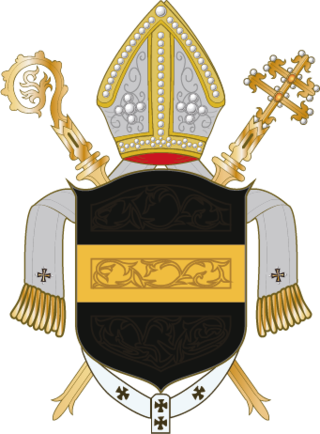
A Generaloberst was the second-highest general officer rank in the German Reichswehr and Wehrmacht, the Austro-Hungarian Common Army, the East German National People's Army and in their respective police services. The rank was equal to a four-star full general but below a general field marshal. The rank was equivalent to a Generaladmiral in the Kriegsmarine until 1945 or to a Flottenadmiral in the Volksmarine until 1990. It was the highest ordinary military rank and the highest military rank awarded in peacetime; the higher rank of general field marshal was awarded only in wartime by the head of state. In general, a Generaloberst had the same privileges as a general field marshal.

Ottokar Theobald Otto Maria Graf Czernin von und zu Chudenitz was an Austro-Hungarian diplomat and politician during the time of World War I, notably serving as Foreign Minister from 1916 to 1918.

Freiherr Ladislaus Hengelmüller von Hengervár, was an Austro-Hungarian diplomat of Hungarian origin who was a long-term Ambassador at Washington D.C., throughout many Presidential administrations including those of William McKinley, Theodore Roosevelt and William Taft.

Konstantin TheodorDumba, was an Austro-Hungarian diplomat serving as its last accredited Ambassador to the United States and famous for having been expelled during World War I following accusations of espionage.

The Military Order of Maria Theresa was the highest military honour of the Habsburg monarchy, Austrian Empire and Austro-Hungarian Empire.

The Archdiocese of Prague (Praha) (Latin: Archidioecesis Pragensis; Czech: Arcidiecéze pražská) is a Metropolitan Latin archdiocese of the Catholic Church in Bohemia, in the Czech Republic.

The Order of Saint Stephen was an order of chivalry founded in 1764 by Maria Theresa. In 1938, Miklós Horthy took the rights and activities of Grand Master as Regent of Hungary. The name of the Order changed to the Royal Hungarian Order of Saint Stephen. The Order was terminated at the time of the proclamation of the Second Hungarian Republic in 1946. It was recreated in 2011 as the Hungarian Order of Saint Stephen, and to this day remains the highest order in Hungary.

The Roman Catholic Archdiocese of Olomouc is a metropolitan archdiocese of the Latin Church of the Catholic Church in the Czech Republic. It has its seat in Olomouc.

Ludwig Alexander Georg Graf von Hoyos, Freiherr zu Stichsenstein was an Austro-Hungarian diplomat who played a major role during the July Crisis while serving as chef de cabinet of the Foreign Minister at the outbreak of World War I in 1914. He was the last chef de cabinet of Austria-Hungary. He was the grandson of Robert Whitehead, the inventor of the torpedo.

The Order of Merit of the Prussian Crown was an award of civil and military merit established 18 January 1901 by King Wilhelm II on the occasion of the bicentennial of the establishment of the Kingdom of Prussia. The order was presented in one class and consisted of a badge and a breast star. For military merit the award was presented with crossed swords. The order was presented once with diamonds.

The Embassy of Austria in London is the diplomatic mission of the Republic of Austria in the United Kingdom. The embassy is located at 18 Belgrave Mews West in the Belgravia area of London, and the residence of the ambassador is located at 18 Belgrave Square.
Thorleif Paus, also known as Thorleif de Paus or Thorleif von Paus, was a Norwegian diplomat, estate owner and businessman. As a 23 year old consular secretary he became Norway's only diplomatic representative to the great power of Austria-Hungary in 1905 and in charge of obtaining diplomatic recognition of Norway following the dissolution of the union between Norway and Sweden; he later served as consul and acting consul-general in Vienna. Paus left Austria-Hungary in 1918 and later became a businessman in Norway, an estate owner in Sweden, where he owned Kvesarum Castle, and finally moved to Copenhagen.
The 27th Infantry Division was an infantry formation of the Russian Imperial Army. It was a part of the 3rd Army Corps.

Hans Maria Clemens Franz Konstantin Freiherrvon Podewils-Dürniz was a Bavarian politician who served as Minister-President of Bavaria 1903–1912.

Alexander von Koller was an Austro-Hungarian military officer, who achieved the rank of General of the cavalry and served as Imperial and Royal Minister of War from 1874 to 1876.
Oberhofmeister of the Austrian King and Emperor was the most important function at the court of the Holy Roman Emperor and the Emperor of Austria in Vienna (1804–1918). The Oberhofmeister acted as the direct head of the Imperial court and household and was as such very influential.












